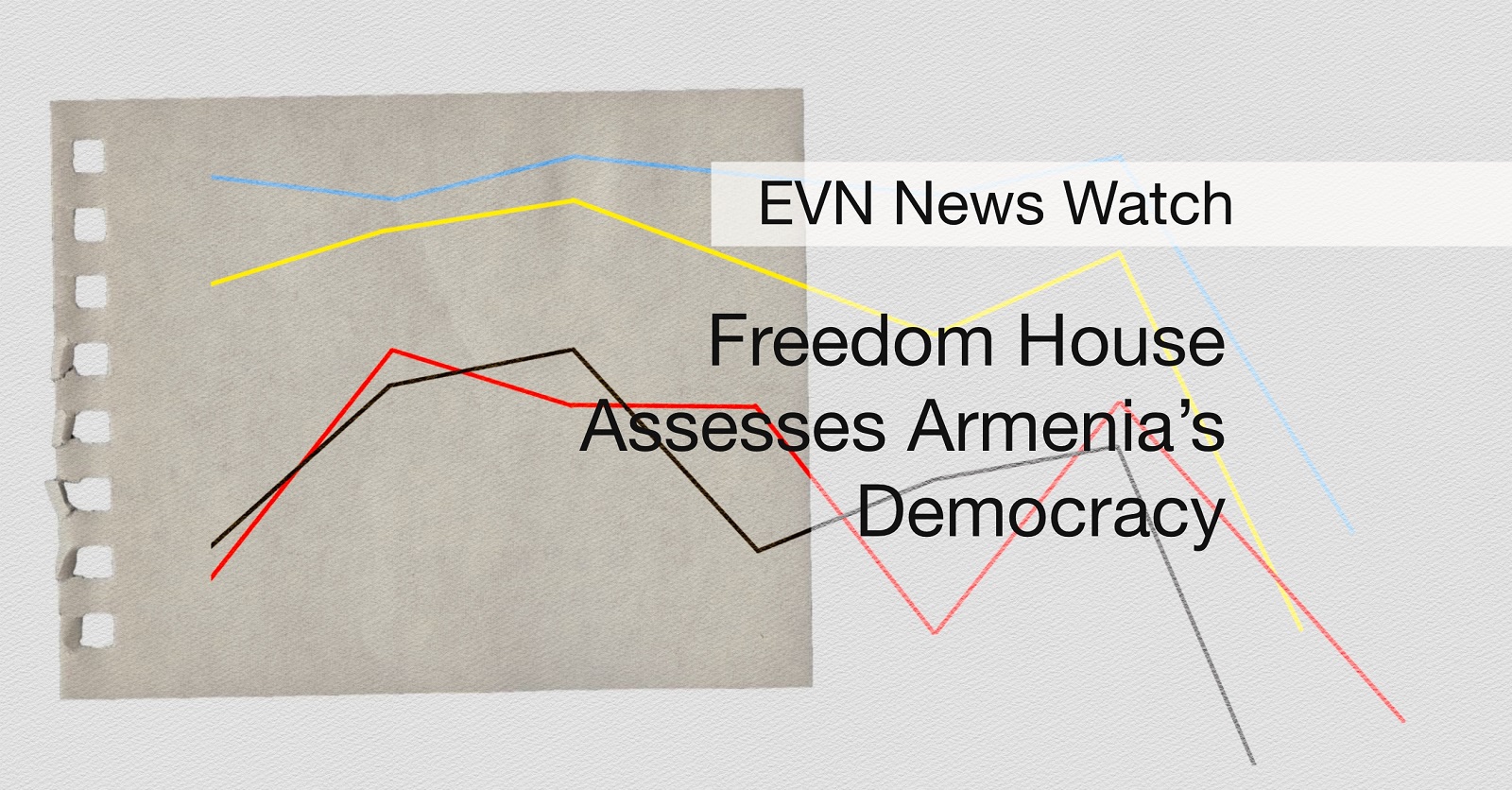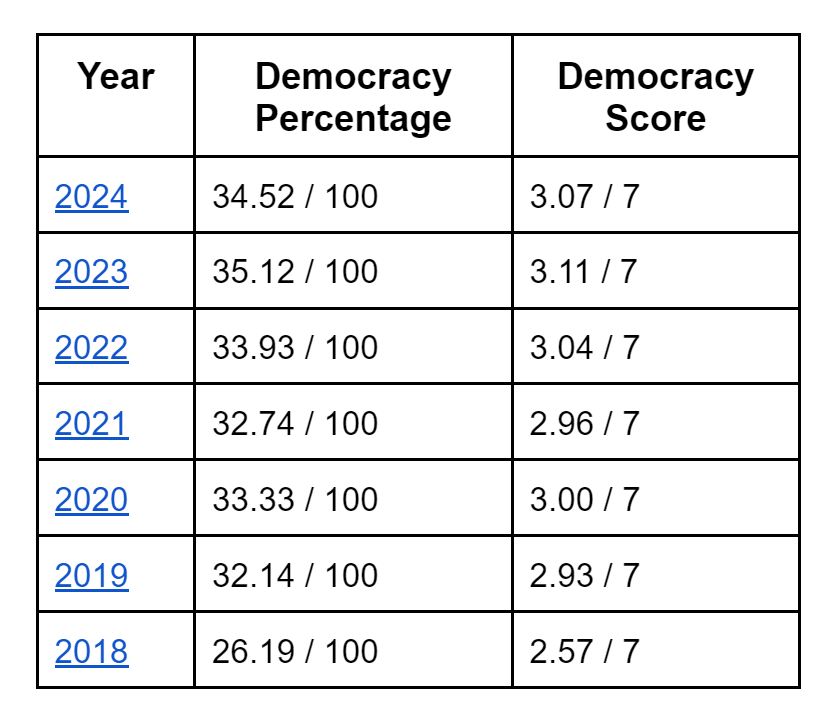
Listen to the article.
In its Nations in Transit 2024 report, Freedom House, a U.S.-based human rights watchdog, assessed the state of democracy in Armenia, and Azerbaijan’s violent takeover of Nagorno-Karabakh (Artsakh).
Azerbaijani Takeover of Karabakh, Continued Threats Against Armenia
The report said Azerbaijan’s “inhumane conquest” of Nagorno-Karabakh, along with the ongoing Russian invasion of Ukraine, has demonstrated the “deadly consequences of autocracy’s expansion.” The report authors, Mike Smeltzer and Alexandra Karppi, wrote the Russian and Azerbaijani “wars of aggression are the two most glaring examples of the disdain that today’s autocrats hold for fundamental human rights and pluralist societies.” They noted that the Aliyev and Putin regimes “cynically demand respect for their own states and sovereignty even as they violently reject their neighbors’ domestic political autonomy, unique histories, and right to exist.” Furthermore, the report said that Western democracies have been “inconsistent and often reluctant in defending international norms against such behavior, allowing autocracies to circumvent or disregard any efforts to hold them accountable.”
The Freedom House report said the flight of the entire population of Karabakh Armenians “amounted to ethnic cleansing” and that Azerbaijan’s “brutal offensive” has “adversely affected” Armenia’s democratization efforts. They also pointed to Azerbaijan’s continued military threats against Armenia’s existence after having occupied slices of Armenian territory in recent years. “Aliyev’s victories—political and military—may have simply whetted his appetite,” they stated, suggesting that without any “credible deterrents” imposed by the United States or the EU, “there is an obvious potential for more authoritarian aggression in the Caucasus.” With Russia having “effectively abdicated as the area’s security guarantor,” Armenia is now “in a race against the clock to secure new alliances in the democratic world.”

Armenia’s Democracy Score Declines
Freedom House lowered Armenia’s democracy score from 3.11 to 3.07 (on a scale of 1 to 7). One component, Armenia’s National Democratic Governance rating, in particular, declined from 2.50 to 2.25 due to what the report said is the “executive’s consolidation of power, the multiyear trend of central authorities overreaching and impeaching opposition mayors, and the lack of transparency in ruling party finances.”
Armenia’s Democracy Score had, since the 2018 revolution, shown continuous improvement. It had grown most substantially in 2018, from 2.57 to 2.93, reaching an all time high of 3.11 in the previous report. Armenia remains a transitional or hybrid regime.
The latest Nations in Transit report stressed that political processes in Armenia last year stemmed from security issues, especially the blockade and ethnic cleansing of Nagorno-Karabakh/Artsakh. Security concerns, it said, exacerbated polarization, “undermining meaningful dialogue on critical issues,” while Pashinyan’s Civil Contract party swiftly greenlights the government’s reform agenda. It noted that the opposition remains unpopular, failing to attract disaffected voters and to meaningfully challenge the government.
Pashinyan’s Civil Contract “continued its practice of impeaching opposition mayors using dubious tactics.” While electoral processes generally received a positive evaluation from observers, they were characterized by “abuse of administrative resources by the ruling party at a scale unprecedented” since 2018. Freedom House pointed to two investigations as evidence of lack of transparency regarding the ruling party’s sources of funding, raising concerns about decoupling of politics from big businesses and oligarchs. Law enforcement agencies did not find any wrongdoing, which the report found concerning.
Freedom House hailed “major positive reforms” in several areas, including the judiciary, the police, the fight against corruption, fiscal policy, the electoral code, education, and territorial administration. It said while some of the reforms “deliver effective regulations, they often fall short of their objectives due to poor or inconsistent implementation.”
Earlier, in its Freedom in the World 2024 report, which tracks trends in political rights and civil liberties, Freedom House gave Armenia a score of 54 out of 100, rating it “partly free”, unchanged from 2023. Released in late February, it rated political rights in Armenia 23 out of 40, and civil liberties 31 out of 60. In the Freedom on the Net 2023 report, analyzing internet freedom, Armenia ranked “free” with a score of 72 out of 100, declining slightly from the previous year.
Armenian Government Responds
Ruling party members, most notably Civil Contract’s parliamentary secretary Artur Hovhannisyan responded to the report cynically. “It is not up to Freedom House to decide whether Armenia is a democracy or not,” he said at a press briefing. This is despite past references by Prime Minister Pashinyan (and Hovhannisyan) on several occasions to Freedom House’s (positive) ratings of Armenia. Even more, in the previous two years Pashinyan personally took part in the Armenian Forum For Democracy organized in part by Freedom House.
Besides, Armenia’s Public Television evidently omitted mentions of shortcomings or criticisms and failed to mention the decline in the Democracy Score in its coverage of the report, in a pattern formerly observed regarding reports by Amnesty International and the State Department. Ara Shirinyan, Chairman of the Council of the Public Broadcaster, responded to the findings that they have covered critical parts of the report, pointing to an interview with ruling party parliamentarian Hasmik Hakobyan. Problematically, however, the text overlaying the video during the interview read: “Problems of displaced people from Nagorno-Karabakh have slowed the process of Armenia’s democratization,” a cherry-picked observation from the report, which said that the crisis has “adversely affected” Armenia’s democratization.

